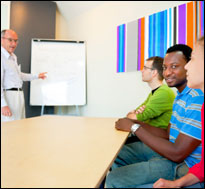For decades, social scientists have studied a community phenomenon often called the “spiral of silence” — a pattern in which individuals are reluctant to express opinions when they perceive that the majority does not support their views. Opinion becomes homogenous and dissent rare. Another parallel idea out of academia is the notion of “social capital,” defined by the scholar Robert Putnam as “features of social life — networks, norms, and trust — that enable participants to act together more effectively to pursue shared objectives.”
A 2012 study published in the International Journal of Public Opinion Research, “Social Capital and the Spiral of Silence,” analyzed survey data from 319 registered voters of Guam to determine the likelihood that citizens with higher levels of social capital would be more inclined to publicly share their private opinions.
The context for the survey was the U.S. military’s plan to increase its presence on the island of Guam. The researchers, from Cleveland State University, the University of Arizona, the University of Wisconsin-La Crosse and Shepherd University, wanted to test how the community might express disagreement with a policy that many of the island’s leaders had already endorsed. The study focused on three key indicators of social capital: the degree of trust among community members; the degree of “neighborliness” — the willingness to help others in need; and degrees of civic engagement, usually defined as membership in social groups and community activities.
The study’s findings include:
- Preexisting levels of “civic engagement had a direct effect on people’s willingness to express opinions” on the U.S. military’s desire to expand its presence on Guam. A high degree of civic engagement and the strong willingness to express one’s opinion did not depend on believing that the majority agreed.
- “Civic engagement is more conducive to connecting people across social divides,” the researchers found. “Participating in civic activities such as community organizations and public meetings could enable people to meet and interact with those from different social and cultural backgrounds, and learn different ideas and perspectives that they may not regularly encounter in everyday life. This bridging quality of civic engagement, combined with its orientation to larger social goals, may enable people to overcome the expectation that others hold similar opinions to their own.”
- Increased levels of trust and neighborliness were associated with a higher perception of support for one’s own opinions — in other words, people who had a high degree of trust and a willingness to help neighbors often assumed that others agreed with them. Based on such assumptions, individuals were more willing to express their own opinions.
- This suggests that “strong neighborly ties and trust form the perception that others share one’s opinions because intimate social interaction and identification tend to stem from networks that rest on strong bonds among group members.”
The study concludes that “individual-level social capital serves as a protective factor against the spiral of silence. Those with higher levels of individual-level social capital, as measured with our indicators, may be more likely to perceive that their opinions are held by the majority and more willing to express their opinions; those with low capital may be less likely to perceive that their opinions are held by the majority and less willing to express their opinions.”
For a sense of how these dynamics play out in an online environment, see a related 2012 study, “The Spiral of Silence and the Internet,” also published in the International Journal of Public Opinion Research.
Tags: cognition


Expert Commentary